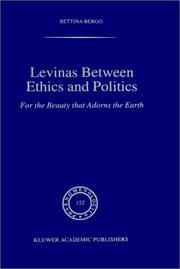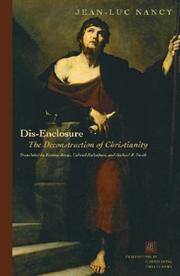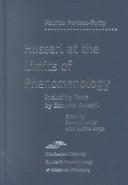| Listing 1 - 9 of 9 |
Sort by
|

ISBN: 0792356942 9048152143 9401720770 9780792356943 Year: 1999 Volume: 152 Publisher: Dordrecht Kluwer
Abstract | Keywords | Export | Availability | Bookmark
 Loading...
Loading...Choose an application
- Reference Manager
- EndNote
- RefWorks (Direct export to RefWorks)
The act of thought-thought as an act-would precede the thought thinking or becoming conscious of an act. The notion of act involves a violence essentially: the violence of transitivity, lacking in the transcendence of thought. . . Totality and Infinity The work of Emmanuel Levinas revolves around two preoccupations. First, his philosophical project can be described as the construction of a formal ethics, grounded upon the transcendence of the other human being and a subject's spontaneous responsibility toward that other. Second, Levinas has written extensively on, and as a member of, the cultural and textual life of Judaism. These two concerns are intertwined. Their relation, however, is one of considerable complexity. Levinas' philosophical project stems directly from his situation as a Jewish thinker in the twentieth century and takes its particular form from his study of the Torah and the Talmud. It is, indeed, a hermeneutics of biblical experience. If inspired by Judaism, Levinas' ethics are not eo ipso confessional. What his ethics takes from Judaism, rather, is a particular way of conceiving transcendence and the other human being. It owes to the philosophy of Franz Rosenzweig and Martin Buber a logos of the world and of the holy, which acknowledges their incom mensurability without positing one as fallen and the other as supernal.
Political philosophy. Social philosophy --- General ethics --- Levinas, Emmanuel --- Political ethics --- Morale politique --- Lévinas, Emmanuel --- Ethics --- Academic collection --- -Lévinas, E. --- Leṿinas, ʻImanuʼel --- Levinas, Emani︠u︡el --- לוינס׳ עמנואל --- לוינס, עמנואל --- -Ethics --- Lévinas, Emmanuel --- Ethics. --- Lévinas, E. --- Lévinas, Emmanuel. --- Līfīnās, Īmānwāl --- ليفيناس، إيمانوال --- Lévinas, Emmanuel, --- Political philosophy. --- Phenomenology . --- Ontology. --- Political Philosophy. --- Phenomenology. --- Being --- Philosophy --- Metaphysics --- Necessity (Philosophy) --- Substance (Philosophy) --- Philosophy, Modern --- Political philosophy --- Deontology --- Ethics, Primitive --- Ethology --- Moral philosophy --- Morality --- Morals --- Philosophy, Moral --- Science, Moral --- Values --- Lévinas, Emmanuel, - 1906-1995 - Ethics --- Lévinas, Emmanuel, - 1906-1995 --- Political ethics.
Book
ISBN: 9780197539712 9780197539736 9780197539743 9780197539729 Year: 2021 Publisher: New York, N.Y. Oxford University Press
Abstract | Keywords | Export | Availability | Bookmark
 Loading...
Loading...Choose an application
- Reference Manager
- EndNote
- RefWorks (Direct export to RefWorks)
Book
ISBN: 0820703346 Year: 2003 Publisher: Pittsburgh, Pa Duquesne University Press
Abstract | Keywords | Export | Availability | Bookmark
 Loading...
Loading...Choose an application
- Reference Manager
- EndNote
- RefWorks (Direct export to RefWorks)
Political philosophy. Social philosophy --- General ethics --- Levinas, Emmanuel

ISBN: 9780823237579 9780823228362 Year: 2009 Publisher: New York, N.Y. Fordham University Press
Abstract | Keywords | Export | Availability | Bookmark
 Loading...
Loading...Choose an application
- Reference Manager
- EndNote
- RefWorks (Direct export to RefWorks)

ISBN: 0810117479 0810117460 9780810117471 9780810117464 Year: 2002 Publisher: Evanston, Ill. Northwestern University Press
Abstract | Keywords | Export | Availability | Bookmark
 Loading...
Loading...Choose an application
- Reference Manager
- EndNote
- RefWorks (Direct export to RefWorks)
Phenomenology. --- Husserl, Edmund, --- Merleau-Ponty, Maurice, --- Phenomenology --- Philosophy, Modern --- Husserl, Edmund --- Husserl, Edmond --- Merleau-Ponty, Maurice --- Husserl, Edmund, - 1859-1938 --- Merleau-Ponty, Maurice, - 1908-1961 --- Merleau-Ponty, Jean Jacques Maurice, --- Merlō-Ponty, Mōris, --- Ponty, Jean Jacques Maurice Merleau-, --- Ponty, Maurice Merleau-, --- מרלו־פונטי, מוריס,
Multi

ISBN: 9780231544382 9780231180443 9780231180450 Year: 2018 Publisher: New York, N.Y. Columbia University Press
Abstract | Keywords | Export | Availability | Bookmark
 Loading...
Loading...Choose an application
- Reference Manager
- EndNote
- RefWorks (Direct export to RefWorks)
From the 1930s through the 1970s, the philosopher Martin Heidegger kept a running series of private writings, the so-called Black Notebooks. The recent publication of the Black Notebooks volumes from the war years have sparked international controversy. While Heidegger's engagement with National Socialism was well known, the Black Notebooks showed for the first time that this anti-Semitism was not merely a personal resentment. They contain not just anti-Semitic remarks, they show Heidegger incorporating basic tropes of anti-Semitism into his philosophical thinking. In them, Heidegger tried to assign a philosophical significance to anti-Semitism, with "the Jew" or "world Judaism" cast as antagonist in his project.How, then, are we to engage with a philosophy that, no matter how significant, seems contaminated by anti-Semitism? This book brings together an international group of scholars from a variety of disciplines to discuss the ramifications of the Black Notebooks for philosophy and the humanities at large. Bettina Bergo, Robert Bernasconi, Martin Gessmann, Sander Gilman, Peter E. Gordon, Hans Ulrich Gumbrecht, Michael Marder, Eduardo Mendieta, Richard Polt, Tom Rockmore, Peter Trawny, and Slavoj Žižek discuss issues including anti-Semitism in the Black Notebooks and Heidegger's thought more broadly, such as German conceptions of Jews and Judaism, Heidegger's notions of metaphysics, and anti-Semitism's entanglement with Heidegger's views on modernity and technology, grappling with material as provocative as it is deplorable. In contrast to both those who seek to exonerate Heidegger and those who simply condemn him, and rather than an all-or-nothing view of Heidegger's anti-Semitism, they urge careful reading and rereading of his work to turn Heideggerian thought against itself. These measured and thoughtful responses to one of the major scandals in the history of philosophy unflinchingly take up the tangled and contested legacy of Heideggerian thought.
Philosophy --- Antisemitism --- Heidegger, Martin,
Multi

ISBN: 9780823238187 9780823230877 Year: 2009 Publisher: New York, N.Y. Fordham University Press
Abstract | Keywords | Export | Availability | Bookmark
 Loading...
Loading...Choose an application
- Reference Manager
- EndNote
- RefWorks (Direct export to RefWorks)
Multi

ISBN: 9780823296569 Year: 2022 Publisher: New York, N.Y. Fordham University Press
Abstract | Keywords | Export | Availability | Bookmark
 Loading...
Loading...Choose an application
- Reference Manager
- EndNote
- RefWorks (Direct export to RefWorks)
Digital

ISBN: 9780271065748 9780271064994 Year: 2015 Publisher: University Park, Pa Penn State University Press
Abstract | Keywords | Export | Availability | Bookmark
 Loading...
Loading...Choose an application
- Reference Manager
- EndNote
- RefWorks (Direct export to RefWorks)
| Listing 1 - 9 of 9 |
Sort by
|

 Search
Search Feedback
Feedback About UniCat
About UniCat  Help
Help News
News